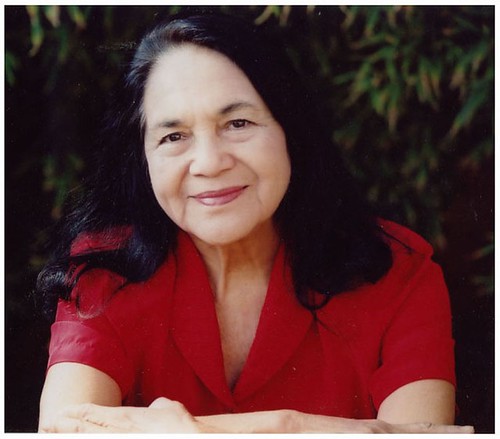Chapter 4 ¡Sí, Se Puede!

A. Warm up
Think about the questions below to prepare you for the topic. Talk about your ideas with your classmate(s).
- Are there farm lands and farmworkers where you live?
- What types of working conditions do farm workers usually experience?
- What do you know about community organizing? What do you think a community organizer does?
- Have you ever heard of or taken part in a boycott?
B. Vocabulary Preview
Search for definitions and/or translations of the words. Review the new terms with your instructor and classmates.
- icon (noun)
- strike (verb and noun)
- boycott (verb and noun)
- farmworker (noun)
- community organizing (noun)
- feminism (noun)
C. Read all about it!
¡Sí, Se Puede!
Dolores Huerta is an icon. She was co-founder of the United Farm Workers Association and was one of the most impactful labor rights organizers of our time. She was a key figure in the Chicano civil rights movement along with César Chávez, who both wanted to support farmworker rights.
Huerta led strikes and boycotts to gain better wages and safer working conditions for farmworkers in California. Huerta witnessed injustices as a teacher of immigrant children. She noticed the poor living and working conditions of the farmworker community and with training in community organizing, decided to help change it. The results of those efforts have made possible something that had never existed before: health care benefits, unemployment, and fair pay and timed breaks. Huerta helped to organize a strike that involved 5,000 workers who picked grapes for the Delano Farm company. Huerta fought for safe working conditions to protect workers from exposure to the pesticides being used on crops.
In talks and interviews, she emphasizes the role of feminism and talks about using our collective power to make change happen, to bring equity and rights to vulnerable members of the community. Huerta has received numerous national awards for her tremendous work as an activist including: the Eleanor Roosevelt Human Rights Award and the Presidential Medal of Freedom. She has served on the board of the Feminist Majority Foundation, as the Secretary-Treasurer Emeritus of the United Farm Workers of America, as well as President of the Dolores Huerta Foundation. Dolores Huerta also created the Dolores Huerta Foundation to help low-income communities receive organizing training.
Her battle cry: “¡Si, Se Puede!”, which translates to “We can do it!” in English, has been a shared statement of power and solidarity for change.
D. Discussion
Talk to your partner(s) about the following questions. Consider choosing roles for the discussion:
- note-taker (write down key ideas that come up)
- time-keeper (make sure you are on track with time)
- facilitator (make sure everyone gets a chance to share)
- speaker (share the key ideas from the discussion with the larger class)
- How did Dolores Huerta first get involved with supporting farmworkers?
- What were some of the farmworker rights that Dolores Huerta fought for?
- The reading talks about Huerta’s training in community organizing. Have you ever heard of community organizing? What do you think it means?
- What is feminism? Why do you think Dolore focuses on feminism as a tool for power?
E. Topics for Writing
Choose a topic to write about. Be sure to practice the five steps in “Getting Ready to Write” to get started with the topic(s) you choose.
- Dolores Huerta shares that community organizing is what has inspired and motivated her to solve the issues in her community. She talks about taking power for change. Write about something that you would like to change in your community. What type of power do you have to make that change happen?
- In Dolores Huerta’s activist work, she focused on fighting for basic human rights and necessities for farmworkers (some examples of these rights include access to water, restrooms, rest, and the right to organize while working in the fields). Write about a human right that not all people in your community have access to (for example affordable housing, a job with fair pay, clean water, etc.) and why it is essential.
- In an award speech, Dolore Huerta was quoted in saying: “Don’t wait to be invited. Step in there.” Huerta often talks about knowing and using our own power for change. Write about a time in your life (or in your friend or family member’s life) when you did not wait to be invited, but instead, stepped in bravely.
- Dolores Huerta created a chant that was used for years as a phrase of solidarity for social change: “¡Si, Se Puede!” which translates to “We can do it!” or “Yes, we can.” Write about a chant, motto, or saying that motivates you. Who created the chant or saying? For what purpose?
F. Project!
Search for information online about another community organizer, important boycott or strike in your region that has made a contribution to social change. Make a presentation about this to your classmates and instructor.
G. Additional Resources
- Video: Dolores Huerta Interview – Los Angeles Public Library
- Video: Still an Activist at 82, Dolores Huerta Calls Herself ‘a Born-Again Feminist’
- Video: Labor of Love: Activist Dolores Huerta still fighting for changes
- TED Talk/Video: How to overcome apathy and find your power
- Article: Dolores Huerta Foundation

